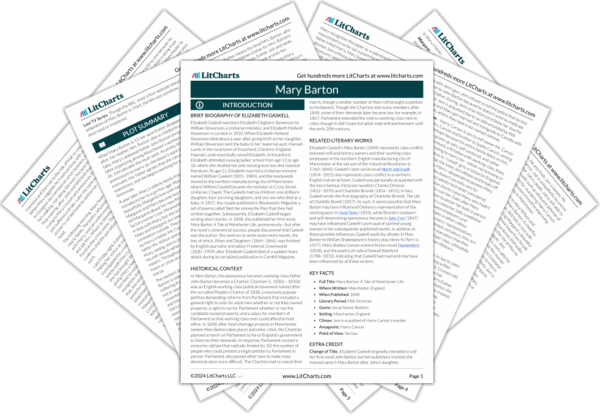In Mary Barton, empathy springs from knowledge: when people understand the facts of one another’s situations, they empathize with and help one another. By contrast, when people don’t understand one another’s situations, they are more likely to be unsympathetic, callous, cruel, or simply indifferent. Thus, the novel implies that people have a moral duty to be curious about one another’s lives. Frequently in the novel, one character will be hostile or cruel to another solely because they are ignorant of a relevant piece of information. For example, when Mary Barton receives a visit from her aunt Esther, she feels estranged from Esther due to Esther’s long, unexplained absence, an estrangement intensified when Esther, a homeless sex worker, lies and tells Mary she’s happily married far across town. Though Esther is desperate to warn Mary against the blandishments of rich suitor Harry Carson, she keeps Mary ignorant of her real reasons for wanting to help: she herself was seduced, “ruined,” and abandoned by a charming army officer. But because Mary doesn’t know this, she is subtly hostile to Esther, drives her away, and forgets about her for a large section of the book. Yet as soon as Mary’s beloved, Jem Wilson, reveals to her the true facts of Esther’s situation, Mary—counter to Esther’s fear that the truth would repel Mary—immediately wants to find and help her aunt. By the time Mary does encounter Esther again, however, it’s too late: Esther is already close to death. Had Mary been more curious about Esther’s life earlier, this outcome might have been avoided. The relationship between Esther and Mary suggests that understanding is crucial to empathy and that, as such, people ought to be appropriately and sympathetically curious about one another’s lives.
Empathy vs. Ignorance ThemeTracker

Empathy vs. Ignorance Quotes in Mary Barton
“I tell you it’s the poor, and the poor only, as does such things for the poor. Don’t think to come over me with th’ old tale that the rich know nothing of the trials of the poor; I say, if they don’t know, they ought to know.”
The weekly drain of wages given for labour, useless in the present state of the market, was stopped. The partners had more leisure than they had known for years[.]
The coffee steamed upon the fire, and altogether the odours were so mixed and appetising that Wilson began to yearn for food to break his fast, which had lasted since dinner the day before. If the servants had known this, they would have willingly given him meat and bread in abundance; but they were like the rest of us, and not feeling hunger themselves, forgot it was possible another might.
So class distrusted class, and their want of mutual confidence wrought sorrow to both. The masters would not be bullied, and compelled to reveal why they felt it wisest and best to offer only such low wages; they would not be made to tell that they were even sacrificing capital to obtain a decisive victory over the continental manufacturers. And the workmen sat silent and stern with folded hands, refusing to work for such pay.
While the men had stood grouped near the door, on their first entrance, Mr Harry Carson had taken out his silver pencil, and had drawn an admirable caricature of them—lank, ragged, dispirited and famine-stricken. Underneath he wrote a hasty quotation from the fat knight’s well-known speech in Henry IV. He passed it to one of his neighbours, who acknowledged the likeness instantly, and by him it was sent round to others, who all smiled and nodded their heads.
A number of pieces of paper (from the identical letter on which the caricature had been drawn that very morning) were torn up, and one was marked.
Gentle, reserved, and prudent herself, never exposed to the trial of being admired for her personal appearance […] Margaret had no sympathy with the temptations to which loveliness, vanity, ambition, or the desire of being admired exposes so many; no sympathy with flirting girls, in short. Then, she had no idea of the strength of conflict between will and principle in some who were differently constituted from herself.
The eyes of John Barton grew dim with tears. Rich and poor, masters and men, were then brothers in the deep suffering of the heart; for was not this the very anguish he had felt for little Tom, in years so long gone by that they seemed like another life!
“You say our talk has done no good. I say it has. I see the view you take of things from the place where you stand.”
To those who have large capability of loving and suffering, united with great power of firm endurance, there comes a time in their woe when they are lifted out of the contemplation of their individual case into a searching inquiry into the nature of their calamity, and the remedy (if remedy there be) which may prevent its recurrence to others as well as themselves.











